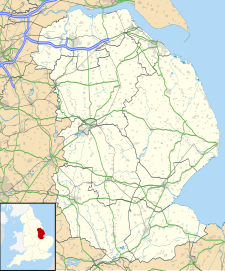Rauceby Hospital
| Rauceby Hospital | |
|---|---|
| Lincolnshire Partnership NHS Foundation Trust | |
 Rauceby Hospital | |
| Geography | |
| Location | Sleaford, Lincolnshire, England |
| Coordinates | 52°59′02″N 0°27′03″W / 52.9839°N 0.4509°W |
| Organisation | |
| Care system | NHS |
| Funding | Government hospital |
| Type | Mental health |
| History | |
| Opened | 1897 |
| Closed | 1997 |
| Links | |
| Lists | Hospitals in England |
Rauceby Hospital, originally called Kesteven County Asylum, is a now-defunct mental institution in the parish of Quarrington, Lincolnshire, England. Originally opened in 1902, the main hospital building was closed in 1997 and the site has since been redeveloped as Greylees.
History
[edit]The hospital was designed by George Thomas Hine using an "echelon layout".[1] Construction began in 1897 and it was officially opened as Kesteven County Asylum on 20 June 1902.[1] The gardens were designed under a separate contract by William Goldring.[1]
An isolation unit, built in 1919 on the western edge of the site was never used as such; instead it housed those residents working on the farm.[1] The facility became Kesteven Mental Hospital in 1924 and Rauceby Mental Hospital in 1933.[2]
In 1940 the building was taken over by the Royal Air Force; renamed as No.4 RAF Hospital Rauceby, it became a crash and burns unit under the control of nearby RAF Cranwell. During its tenure as a burns unit plastic surgeon Archibald McIndoe worked at the facility, along with other members of the "Guinea Pig Club".[3] The wartime Burns Unit was situated in Orchard House, built alongside the hospital orchard.[4]
There was a major fire in the hall in 1945 and it was badly damaged although it was subsequently restored.[1] The RAF handed the hospital back for civilian use in 1947 and it joined the National Health Service as Rauceby Hospital in 1948 although patients did not actually return until 1949.[1]
After the introduction of Care in the Community in the early 1980s, the hospital went through a period of decline and finally closed in December 1997.[1] The site was subsequently developed for residential use by David Wilson Homes as "Greylees".[1]
The former isolation unit, now known as Ash Villa, functions as a 12-bedded in-patient unit for age 12–18 years within the child and adolescent mental health services under the control of the Lincolnshire Partnership NHS Foundation Trust.[5]
References
[edit]- ^ a b c d e f g h "Rauceby". County Asylums. Retrieved 15 October 2018.
- ^ "Rauceby Hospital". Lincolnshire Archives (incorporating Lincoln Diocesan Record Office). Archived from the original on 19 March 2012. Retrieved 3 March 2011.
- ^ Johnston, Philip Ralph. "No 4 RAF Hospital Rauceby". Retrieved 3 March 2011.
Known formally as No 4 RAF Hospital Rauceby, the hospital acted in many ways as a satellite to the Cranwell unit, with 1000 beds, focussing through its Crash and Burns unit on supporting aircrew injured on operations. Most famously the pioneering plastic surgeon Archibald McIndoe was part of this team, many of his early patients forming a drinking club known as the 'Guinea Pig Club'.
- ^ "Town and Country Planning Act 1990 – Refusal of Planning Permission" (PDF). Sleaford, Lincolnshire: North Kesteven District Council. 22 January 2009. Retrieved 3 March 2011.
Historic records sourced by the District Planning Authority confirm that the application site, which is currently an Orchard, is one of the last vestiges of the original parkland grounds designed by Landscape Architect William Goldring in 1900 to serve the former Kesteven County Asylum. The grounds were carefully designed to serve as both a parkland setting for the architecture of the Asylum buildings whilst also providing for horticultural activities to aid the ongoing therapy of Asylum residents, including through the provision of fruit trees in an Orchard.
- ^ "Ash Villa". Lincolnshire Partnership NHS Trust. Retrieved 15 October 2018.
External links
[edit]- Simon Cornwell. "Rauceby virtual asylum facts and trivia". Retrieved 3 March 2011.
- "Simon Cornwell's Urbex photo gallery".

